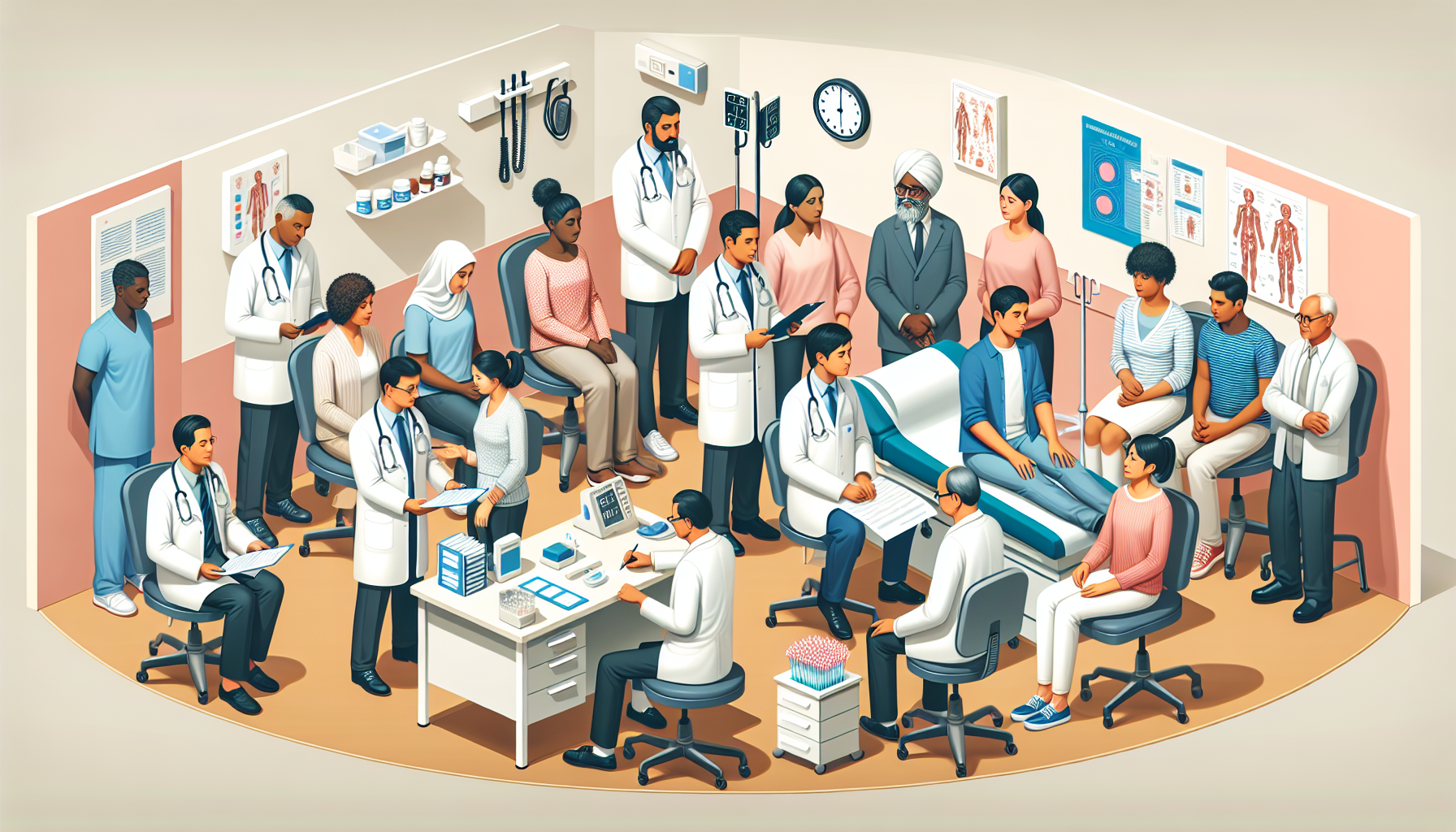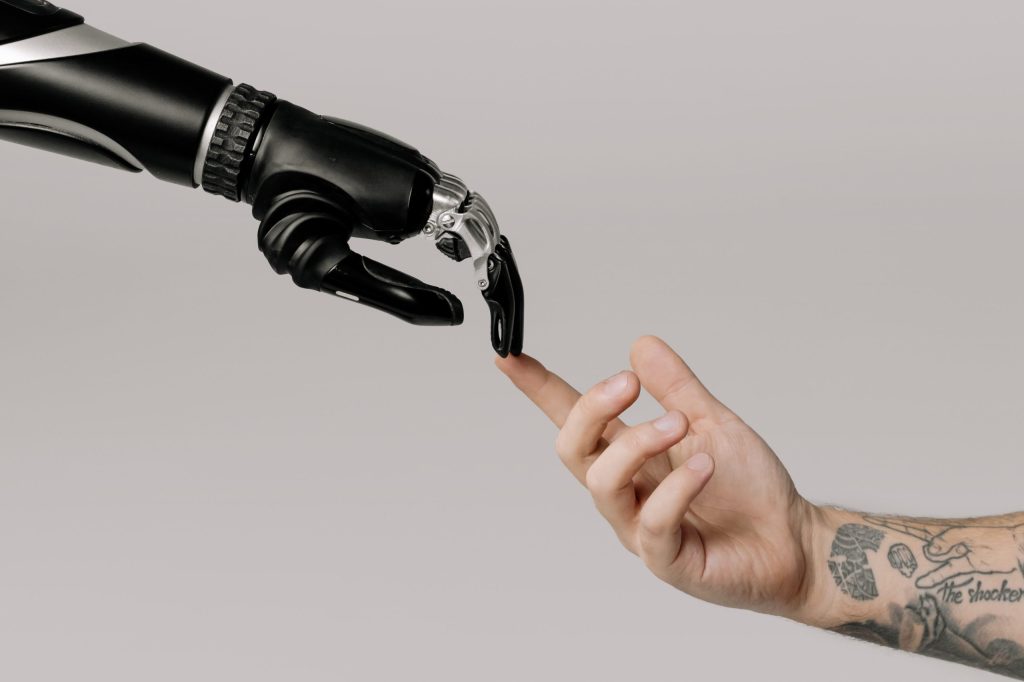AI in healthcare is no longer fiction. I saw the movie Prometheus a while ago and I can remember a scene where a woman who somehow had an alien being growing in her belly used some sophisticated AI-powered robotic probes to perform a C-section on herself getting rid of the alien life-form.
Imagine a future where healthcare is practiced with so much precision that the outcomes of treatment for patients become revolutionary. That future is already here with even more astounding promises – well, maybe not yet quite like I described in the movie, but you get the gist.
This revolution no longer resides in the fantasies of sci-fi movies. With Artificial Intelligence (AI) these fantasies are being transformed into promises for a better life.
The integration of AI in healthcare isn’t just a leap; it’s a revolutionary evolution. From enhancing diagnostics to streamlining operations, the potential of AI in healthcare is vast and exciting.
”We need to design and build AI that helps healthcare professionals be better at what they do. The aim should be enabling humans to become better learners and decision-makers.”
Mihaela van der Schaar, PhD, director of the Cambridge Centre for AI in Medicine at the University of Cambridge in the U.K.
Come with me to explore the incredible impact of AI in healthcare, across 20 applications.
1. Medical Imaging and Diagnostics
Medical imaging has moved with AI to unprecedented levels. Machine learning algorithms analyze vast amounts of imaging data such as X-rays, MRIs, and CT scans with extraordinary precision.
This analysis helps in the early detection of diseases, accurate diagnosis, and treatment planning. Radiologists benefit from AI’s assistance, allowing them to focus more on nuanced aspects of patient care.
Furthermore, AI aids in triaging patients and prioritizing critical cases for urgent attention. For example, in emergency rooms, AI can quickly analyze and identify severe cases based on imaging, ensuring life-saving interventions are promptly administered. The profound impact of AI in medical imaging is enhancing healthcare outcomes and saving lives.
2. Drug Discovery and Development

The process of discovering and developing new drugs is significantly accelerated with the help of AI. Pharmaceutical companies are leveraging AI to sift through colossal datasets and identify potential drug candidates.
AI predicts drug effectiveness, potential side effects, and optimal dosages. This expedites the drug development cycle, translating to faster availability of life-saving drugs for patients in need.
Moreover, AI enables the analysis of genetic and biological data to identify biomarkers associated with diseases. This knowledge guides drug discovery by identifying specific patient populations that may respond well to certain treatments. The marriage of AI and drug discovery is a beacon of hope, promising a brighter and healthier future for all.
Read Also: Travails of the Pharmaceutical Industry in Nigeria & Potential Solutions
3. Personalized Medicine
Personalized medicine is a groundbreaking concept in healthcare, and AI is the driving force behind its realization. AI analyzes diverse patient data, including genetic information, lifestyle, and medical history, to tailor treatment plans unique to each individual.
This ensures that patients receive treatments that are most effective for their specific conditions, optimizing outcomes and reducing adverse effects.
The power of AI in personalized medicine is reshaping how diseases are treated and managed. It’s a paradigm shift from the one-size-fits-all approach to a personalized, patient-centric model. AI-driven personalized medicine holds immense promise, elevating healthcare to a new level of precision and effectiveness.
4. Virtual Health Assistants
AI-powered virtual health assistants, often in the form of chatbots or virtual voice assistants, are changing the way patients interact with healthcare services.
These assistants provide instant responses to medical inquiries, offer guidance, and help schedule appointments. They operate 24/7, enhancing accessibility to healthcare information and assistance at any time, from anywhere.
Virtual health assistants are particularly beneficial for routine queries and initial symptom assessment, empowering patients with knowledge and assisting them in making informed decisions about seeking further medical help.
The convenience and accessibility they bring to healthcare are invaluable, ensuring a seamless and efficient patient experience.
Read Also: 20 Innovative HealthTech Startups in Nigeria That You Need To Know About!
5. Remote Patient Monitoring
AI in healthcare is a game-changer in remote patient monitoring, significantly impacting the management of chronic diseases. Wearable devices equipped with sensors continuously collect vital health data from patients, such as heart rate, blood pressure, and glucose levels.
AI algorithms analyze this data, identifying patterns and potential issues. Healthcare providers receive real-time alerts, enabling timely interventions and proactive healthcare management.
This approach not only improves patient outcomes but also reduces the strain on healthcare systems by minimizing hospital readmissions and emergency room visits.
This data can also be fed into the Electronic Health Records of the hospital to generate Meaningful Longitudinal Data.
6. Predictive Analytics for Hospital Operations
In the dynamic environment of healthcare, optimizing hospital operations is crucial for delivering quality care efficiently. AI’s predictive analytics capabilities analyze vast amounts of historical and real-time data.
This includes patient admissions, discharges, staffing levels, and resource utilization. By identifying trends and patterns, AI helps healthcare institutions forecast patient admission rates, allocate resources accordingly, optimize staff schedules, and streamline workflows.
This not only enhances efficiency but also ensures that healthcare professionals can focus more on patient care, ultimately improving the overall healthcare experience. The result? More effective, cost-efficient healthcare delivery.
7. Clinical Trials Optimization

AI is a powerful tool in streamlining and optimizing the design and execution of clinical trials. Traditional clinical trials can be time-consuming and resource-intensive.
AI changes this landscape by analyzing vast amounts of data to identify suitable candidates for trials, predict patient responses to treatments, and optimize trial protocols. This results in accelerated trial processes, reduced costs, and increased success rates.
Ultimately, AI’s contribution to clinical trials is accelerating the development and approval of new drugs and treatments, bringing them to patients in need faster than ever before. This not only saves lives but also significantly improves the efficiency of the drug development pipeline.
8. Natural Language Processing for Medical Records
Natural Language Processing (NLP) is an AI application that has revolutionized the handling of unstructured medical data found in medical records.
By convert
It enables accurate and efficient extraction of relevant information from clinical notes, reports, and other medical documents. NLP’s role in healthcare is pivotal, facilitating better patient care through improved clinical decision-making, research, and administrative processes.
Read Also: Don’t be Ignorant! 4 Revolutionary Retail Pharmacy Trends in Nigeria
9. Fraud Detection and Billing Optimization
AI plays a crucial role in ensuring the integrity of healthcare systems by detecting fraudulent activities and optimizing billing processes.
Machine learning algorithms analyze large volumes of billing data, identifying irregularities and potentially fraudulent claims. This not only protects the financial health of healthcare systems but also ensures fair billing practices.
Optimizing billing processes through AI reduces errors, minimizes delays in reimbursements, and streamlines financial operations for healthcare providers, ultimately contributing to a more efficient and sustainable healthcare ecosystem.
10. Robot-Assisted Surgery
Robotic surgery, empowered by AI, has revolutionized the surgical landscape, enhancing precision and outcomes. AI algorithms analyze pre-operative data to create personalized surgical plans, guiding robots during surgery to execute precise movements.
Surgeons benefit from real-time feedback and assistance, enabling them to perform complex procedures with unparalleled precision and safety.
This union of AI in healthcare and robotics is revolutionizing surgery, making procedures less invasive, reducing recovery times, and ultimately improving the quality of life for patients.
11. Behavioral Health
AI’s impact on behavioral health is profound, providing innovative solutions to diagnose, treat, and monitor mental health conditions.
AI algorithms can analyze language patterns, voice tones, and other behavioral cues to identify signs of mental health issues.
Virtual mental health assistants, driven by AI, provide support, guidance, and therapeutic interventions. These advancements enhance accessibility to mental healthcare, reduce stigma, and contribute to early intervention and improved outcomes for individuals grappling with mental health challenges.
12. AI-Powered Prosthetics and Orthotics
AI is revolutionizing the field of prosthetics and orthotics, designing devices that adapt and respond to the user’s movements and needs.
Machine learning algorithms continuously learn from user interactions, improving the device’s functionality and comfort over time. This personalized approach enhances the quality of life for individuals with limb differences, providing them with devices that seamlessly integrate into their daily activities.
AI’s role in this domain showcases a promising future, where technology enhances mobility and independence for those in need.
13. Genomic Analysis for Cancer
Genomic analysis, powered by AI, is a critical tool in the fight against cancer. AI algorithms can analyze vast genomic datasets to identify mutations and patterns associated with various types of cancer.
This information helps in developing targeted therapies, choosing the most effective treatment plans, and predicting disease progression.
AI’s assistance in genomic analysis is not only advancing cancer research but is also bringing hope to countless patients by offering personalized treatments and improving survival rates.
Read Also: Travails of the Pharmaceutical Industry in Nigeria & Potential Solutions
14. Voice and Speech Recognition for Physicians
AI-driven voice and speech recognition technology is streamlining healthcare documentation, a historically time-consuming task for physicians.
AI algorithms transcribe and analyze physician-patient conversations, converting them into accurate and structured text. This not only improves efficiency but also enables healthcare professionals to focus more on patient care.
The ease and speed of documentation that AI provides significantly contribute to the overall productivity and effectiveness of healthcare delivery.
15. Healthcare Chatbots for Mental Health
AI-powered healthcare chatbots are making a significant impact on mental health support. These chatbots are designed to engage with individuals, providing a safe and anonymous space to discuss their mental health concerns.
By leveraging AI, these chatbots can offer immediate support, share coping strategies, and connect individuals to appropriate resources.
This accessibility is vital in addressing the growing mental health crisis, providing an avenue for seeking help and fostering mental wellness.
16. Emergency Room Triage Optimization
In busy emergency rooms, timely and accurate triaging is essential to prioritize patients based on the severity of their conditions.
AI algorithms process and analyze patient data, including symptoms and vital signs, to quickly determine the urgency of each case.
This helps healthcare professionals efficiently allocate resources and focus on critically ill patients, ultimately improving the chances of a positive outcome in critical situations.
17. Automated Medical Billing and Coding
AI’s role in automating medical billing and coding processes is a game-changer for healthcare administration. Machine learning algorithms process medical records to generate accurate billing codes, reducing administrative burden and minimizing errors.
This automation optimizes revenue cycles, accelerates billing procedures, and ensures compliance with coding standards, leading to more efficient financial operations for healthcare providers.
18. Fall Detection for Seniors

AI-powered fall detection systems play a crucial role in ensuring the safety and well-being of the elderly population. Integrated with sensors and cameras, AI algorithms can detect falls in real time.
In the event of a fall, alerts are sent to caregivers or emergency responders, enabling rapid assistance and potentially preventing severe injuries. This application of AI enhances elderly care, providing peace of mind to both seniors and their families.
Read Also: Travails of the Pharmaceutical Industry in Nigeria & Potential Solutions
19. Clinical Decision Support Systems
AI-driven clinical decision support systems analyze vast amounts of patient data, medical research, and best practice guidelines. By applying machine learning, these systems provide real-time, evidence-based recommendations to healthcare professionals during patient care.
This assists in making informed decisions, optimizing treatment plans, and enhancing patient outcomes. The integration of AI in clinical decision-making is revolutionizing healthcare, improving the quality and effectiveness of care delivery.
20. Healthcare IoT and Wearables
The synergy of AI and the Internet of Things (IoT) is shaping a new era of personalized and proactive healthcare. IoT devices and wearables, enriched with AI capabilities, are empowering individuals to take charge of their health like never before.
These devices continuously collect a myriad of health data, such as heart rate, activity levels, sleep patterns, and more. AI algorithms analyze this data in real time, providing insights and trends that can help individuals make informed decisions about their health and lifestyle.
Through AI-powered healthcare IoT and wearables, patients and healthcare providers can have a comprehensive view of health metrics and patterns over time.
For patients, this means a deeper understanding of their health, enabling them to make lifestyle adjustments or seek medical attention as needed.
For healthcare providers, it means more data-driven and personalized care plans, as they can tailor treatments based on the rich, real-world data collected from their patients.
This technological convergence is not only enhancing individual well-being but also revolutionizing healthcare on a broader scale, ushering in an era where prevention and proactive care take center stage.
Read Also: How to Start a Successful Retail Pharmacy in Nigeria in 7 Steps
Conclusion
The potential applications of AI in healthcare are vast and transformative. From personalized medicine to improved diagnostics and beyond, AI is revolutionizing healthcare, bringing about a brighter, healthier future. Let’s embrace this incredible evolution and work towards a world where AI and healthcare collaborate to save lives and enhance well-being. Stay tuned for more updates on the exciting world of AI in healthcare!
Explore the future of healthcare with AI, and witness the incredible impact it can have on the lives of people around the world. Together, we can achieve a healthier and brighter tomorrow!
FAQ
Q1: Is AI replacing human healthcare professionals?
A1: No, AI in healthcare is designed to assist and enhance the capabilities of healthcare professionals, not replace them. It augments decision-making and efficiency, ultimately leading to better patient outcomes.
Q2: Is AI in healthcare safe and secure?
A2: Yes, extensive measures are in place to ensure the security and privacy of patient data. Strict regulations and compliance standards are followed to safeguard sensitive healthcare information and maintain patient confidentiality.
Q3: Can AI be affordable for all healthcare providers?
A3: The cost of implementing AI in healthcare is decreasing as technology advances. Many AI solutions offer scalable options, making it accessible to a wide range of healthcare providers, including small practices and clinics.


Pingback: Sitting Disease Putting Nearly 1.8 Billion Adults at Risk - Ideaspro